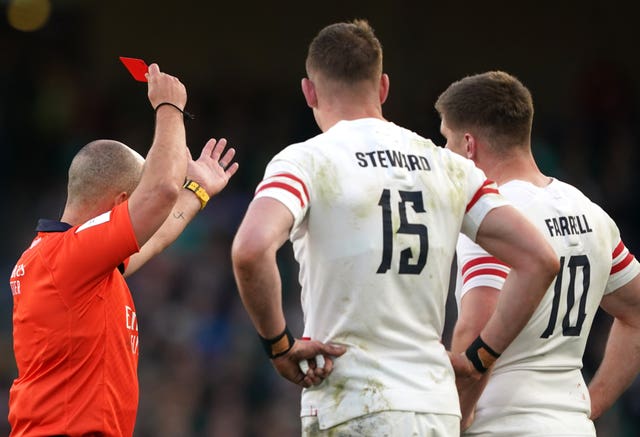
Ireland were crowned Grand Slam champions with a hard-fought victory over England in Dublin, bringing to a close a captivating Guinness Six Nations.
Here, the PA news agency examines five things learnt from the tournament.
The table doesn’t lie
The final standings.#GuinnessSixNations pic.twitter.com/6CVRv49oje
— Guinness Six Nations (@SixNationsRugby) March 18, 2023
The final Six Nations table mirrors the global rankings, providing an accurate picture of the balance of power in Europe. Ireland and France will lead the northern hemisphere’s charge at the World Cup this autumn, Scotland are a quality outfit but not equipped to topple the giants, England and Wales are mired in crisis and rapidly-improving Italy just lack the composure at critical moments needed to be truly competitive. As a spectacle the 2023 Six Nations delivered lavishly with the round-two collision between Ireland and France international rugby at its thunderous best.
Ireland and France carry the flag
Merci à tous pour votre soutien incroyable pendant ce tournoi Hâte de vous retrouver en septembre… 💪🏼🇫🇷Merci et bravo à tout le groupe 💙Congrats @IrishRugby 👏🏼👏🏼👏🏼#FRAPDG pic.twitter.com/lFJUkLYC1M
— 𝗔𝗻𝘁𝗼𝗶𝗻𝗲 𝗗𝗨𝗣𝗢𝗡𝗧 (@Dupont9A) March 18, 2023
Europe has never been better positioned to produce a second World Cup winner after England’s vintage of 2003, but important questions still hover over both the main contenders. Ireland showed against England that they possess the resolve to match their tactical precision, but can they overcome a history of peaking before the global showpiece to the point they have never progressed beyond the quarter-finals? And France are also carrying psychological baggage as while worthy favourites, there remains a gnawing doubt over their ability to cope with the pressure of performing at a home World Cup that was given fuel by their wobble against Scotland in round three.
England in the doldrums
 Steve Borthwick faces an almighty challenge (Adam Davy/PA)
Steve Borthwick faces an almighty challenge (Adam Davy/PA)
Steve Borthwick’s men climbed off the canvas and came out swinging against Ireland, showing the resilience that was missing in their record home defeat by France a week earlier. Appetite for the fight was the minimum requirement in Dublin and they battled themselves to a standstill, repairing some of the damage inflicted at Twickenham. But with no more competitive games until the World Cup, Borthwick faces the impossible task of addressing the myriad shortcomings left by the Eddie Jones era. On the plus side the set-piece has improved, but overall this Six Nations has exposed the depth of English rugby’s malaise.
Sexton strides the Six Nations pantheon
 Johnny Sexton is to retire after the World Cup (Brian Lawless/PA)
Johnny Sexton is to retire after the World Cup (Brian Lawless/PA)
As Johnny Sexton limped off apparently injured during the act of stopping Jamie George from scoring a try with typical disregard for self-presentation, the Aviva Stadium rose in standing ovation for one of the all-time greats. It was fitting that the 37-year-old fly-half signed off by replacing Ronan O’Gara as the Championship’s leading points scorer of all time and he remains Ireland’s single most influential figure heading into the World Cup. Antoine Dupont confirmed his status as the sport’s foremost player by running rings around England and Wales in a dazzling finish, while Finn Russell amply illustrated his own genius, but this tournament belonged to Sexton.
Red card divide
 Freddie Steward is sent off by Jaco Peyper (Brian Lawless/PA)
Freddie Steward is sent off by Jaco Peyper (Brian Lawless/PA)
It was an opinion-dividing decision to set the alarm bells ringing for the World Cup as Freddie Steward was sent off for catching Hugo Keenan’s head with his elbow as he turned to avoid contact. There was not a hint of malice from one of England’s most affable characters, but as Jaco Peyper meticulously worked through the head contact protocols, it was clear the South African referee had no option but to to reach for the red card. Cue howls of protest along the lines of ‘the game’s gone soft’ and ‘it was a rugby incident’, but Steward’s departure was inevitable given the zero tolerance approach taken to head contact. For all that, the sport collectively holds it breath that a similar incident does not take place in the World Cup final when the fallout would be seismic.


Why are you making commenting on The National only available to subscribers?
We know there are thousands of National readers who want to debate, argue and go back and forth in the comments section of our stories. We’ve got the most informed readers in Scotland, asking each other the big questions about the future of our country.
Unfortunately, though, these important debates are being spoiled by a vocal minority of trolls who aren’t really interested in the issues, try to derail the conversations, register under fake names, and post vile abuse.
So that’s why we’ve decided to make the ability to comment only available to our paying subscribers. That way, all the trolls who post abuse on our website will have to pay if they want to join the debate – and risk a permanent ban from the account that they subscribe with.
The conversation will go back to what it should be about – people who care passionately about the issues, but disagree constructively on what we should do about them. Let’s get that debate started!
Callum Baird, Editor of The National
Comments: Our rules
We want our comments to be a lively and valuable part of our community - a place where readers can debate and engage with the most important local issues. The ability to comment on our stories is a privilege, not a right, however, and that privilege may be withdrawn if it is abused or misused.
Please report any comments that break our rules.
Read the rules hereLast Updated:
Report this comment Cancel